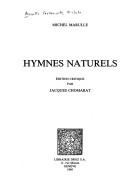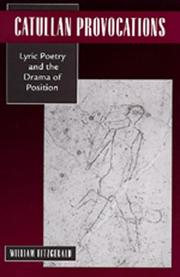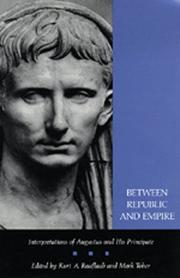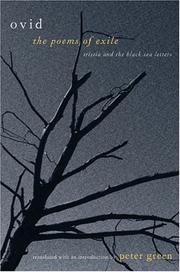| Listing 1 - 9 of 9 |
Sort by
|
Book
ISBN: 9783110405873 9783110406986 Year: 2017 Publisher: Berlin ; Boston De Gruyter
Abstract | Keywords | Export | Availability | Bookmark
 Loading...
Loading...Choose an application
- Reference Manager
- EndNote
- RefWorks (Direct export to RefWorks)
Juvenal --- Roman poetry --- satire --- Iuvenalis, Decimus Iunius --- Juvenal --- Roman poetry --- satire
Book
ISBN: 9783110472523 311047252X 3110474174 3110475871 Year: 2016 Volume: 36 Publisher: Berlin De Gruyter
Abstract | Keywords | Export | Availability | Bookmark
 Loading...
Loading...Choose an application
- Reference Manager
- EndNote
- RefWorks (Direct export to RefWorks)
The political allegiances of major Roman poets have been notoriously difficult to pin down, in part because they often shift the onus of political interpretation from themselves to their readers. By the same token, it is often difficult to assess their authorial powerplays in the etymologies, puns, anagrams, telestichs, and acronyms that feature prominently in their poetry. It is the premise of this volume that the contexts of composition, performance, and reception play a critical role in constructing poetic voices as either politically favorable or dissenting, and however much the individual scholars in this volume disagree among themselves, their readings try to do justice collectively to poetry’s power to shape political realities. The book is aimed not only at scholars of Roman poetry, politics, and philosophy, but also at those working in later literary and political traditions influenced by Rome's greatest poets.
Latin poetry --- Power (Social sciences) in literature --- Politics in literature --- History and criticism --- Congresses --- Latin poetry. --- History and criticism. --- Authorial construction. --- Roman poetry. --- reception.
Book

ISBN: 3110474174 3110475871 9783110475876 9783110475883 311047588X 9783110474176 9783110472523 311047252X Year: 2016 Publisher: Berlin Boston
Abstract | Keywords | Export | Availability | Bookmark
 Loading...
Loading...Choose an application
- Reference Manager
- EndNote
- RefWorks (Direct export to RefWorks)
The political allegiances of major Roman poets have been notoriously difficult to pin down, in part because they often shift the onus of political interpretation from themselves to their readers. By the same token, it is often difficult to assess their authorial powerplays in the etymologies, puns, anagrams, telestichs, and acronyms that feature prominently in their poetry. It is the premise of this volume that the contexts of composition, performance, and reception play a critical role in constructing poetic voices as either politically favorable or dissenting, and however much the individual scholars in this volume disagree among themselves, their readings try to do justice collectively to poetry’s power to shape political realities. The book is aimed not only at scholars of Roman poetry, politics, and philosophy, but also at those working in later literary and political traditions influenced by Rome's greatest poets.
Book
ISBN: 1787448746 1640140778 Year: 2020 Publisher: Rochester, NY : Camden House,
Abstract | Keywords | Export | Availability | Bookmark
 Loading...
Loading...Choose an application
- Reference Manager
- EndNote
- RefWorks (Direct export to RefWorks)
Identifies and explores Roman modes of poetry as received by twentieth- and twenty-first-century Anglo-American, German, and French poets.
Poetry, Modern --- Roman influences. --- History and criticism. --- Anglo-American poets. --- Augustan Rome. --- French poets. --- German poets. --- Roman heritage. --- Roman influence. --- Roman modes. --- Roman poetry. --- Roman symbolism. --- classical poetry. --- literary criticism. --- literary influence. --- literary themes. --- modern poets. --- modern reception.

ISBN: 2600000828 9782600000826 Year: 1995 Volume: 296 Publisher: Genève Droz
Abstract | Keywords | Export | Availability | Bookmark
 Loading...
Loading...Choose an application
- Reference Manager
- EndNote
- RefWorks (Direct export to RefWorks)
Hymns, Latin (Medieval and modern) --- Gods, Roman --- Nature --- Translations into French. --- Poetry. --- -Hymns, Latin (Medieval and modern) --- -Nature --- -Latin hymns, Medieval and modern --- Roman gods --- Poetry --- Translations into French --- -Poetry --- Latin hymns, Medieval and modern --- Hymns, Latin (Medieval and modern) - Translations into French --- Gods, Roman - Poetry. --- Nature - Poetry.
Book
ISBN: 1282934031 9786612934032 3110254492 3110209152 9783110209150 9783110254495 Year: 2011 Volume: 1371 Publisher: Berlin New York De Gruyter
Abstract | Keywords | Export | Availability | Bookmark
 Loading...
Loading...Choose an application
- Reference Manager
- EndNote
- RefWorks (Direct export to RefWorks)
Die auf W. Morel (1927) zurückgehende, von K. Büchner (1982) und J. Blänsdorf (1995) stark erweiterte textkritische Ausgabe der lateinischen Dichterfragmente wurde erneut durchgesehen und bibliographisch ergänzt. Diese 4. Auflage umfasst (bei fast gleicher Seitenzahl dank sparsamerer Formatierung) etwa 10% mehr Material als die 3. Auflage, nunmehr 1036 Fragmente von 148 bekannten und weiteren unbekannten Autoren. Hinzugefügt wurden vor allem die nicht-epischen Fragmente des Ennius und zahlreiche neue Konjekturen. Die neukonstituierten textkritischen Apparate wurden um die Angabe der Versgattungen erweitert. Zusätzlich zu den Gesamtindizes werden größere Fragmentkomplexe durch Konkordanzen erschlossen. This 4th edition of the "Fragmenta Poetarum Latinarum" contains 1036 fragments from 148 known and numerous unknown poets from the beginnings of Latin literature to the end of antiquity. Nearly the same number of pages as in the 3rd edition contain about 10% more dates. Besides an extended bibliography, several new fragments and a series of new conjectures, the non-epic fragments of Ennius and the indications of metre have been added, the critical apparatuses have been reconstituted, several indices link the numbers of fragments to those of other editions.
Epic poetry, Latin. --- Latin poetry. --- Lost literature -- Rome. --- Lyric poetry. --- Lost literature --- Languages & Literatures --- Greek & Latin Languages & Literatures --- Latin epic poetry --- Latin poetry --- Latin literature --- Poésie latine --- Poésie épique latine --- Lost literature - Rome --- Epici. --- Fragments. --- Lyrici. --- Poetae Latini. --- Roman Poetry.

ISBN: 0520200624 0520221567 0520924096 0585153388 9780520924093 9780585153384 9780520200623 Year: 1995 Volume: 1 Publisher: Berkeley, California : University of California Press,
Abstract | Keywords | Export | Availability | Bookmark
 Loading...
Loading...Choose an application
- Reference Manager
- EndNote
- RefWorks (Direct export to RefWorks)
Restoring to Catullus a provocative power that familiarity has tended to dim, this book argues that Catullus challenges us to think about the nature of lyric in new ways. Fitzgerald shows how Catullus's poetry reflects the conditions of its own consumption as it explores the terms and possibilities of the poet's license. Reading the poetry in relation to the drama of position played out between poet, poem, and reader, the author produces a fresh interpretation of almost all of Catullus's oeuvre. Running through the book is an analysis of the ideological stakes behind the construction of the author Catullus in twentieth-century scholarship and of the agenda governing the interpreter's position in relation to Catullus.
Epigrams, Latin --- -Love poetry, Latin --- -Verse satire, Latin --- -Elegiac poetry, Latin --- -Latin elegiac poetry --- Latin poetry --- Latin verse satire --- Latin love poetry --- Latin epigrams --- History and criticism --- Catullus, Gaius Valerius --- -Catul --- Catull --- Catulle --- Catulli, C. Valerii --- Catullo, Gaio Valerio --- Catullus, C. Valerius --- Catullus, Gaius Valerius, --- Catullus, Gajus Valerius --- Catulo --- Katull, Gaǐ Valeriǐ --- Katullus, Kaius Valerius --- Valerio Cátulo, Cayo --- Катулл --- Criticism and interpretation --- Rome --- In literature. --- Elegiac poetry, Latin --- Love poetry, Latin --- Verse satire, Latin --- History and criticism. --- Criticism and interpretation. --- Catul --- Languages & Literatures --- Greek & Latin Languages & Literatures --- Catullus, Caius Valerius --- aesthetic. --- ancient rome. --- ariadne. --- asinius. --- bithynia. --- caelius. --- caesar. --- callimachus. --- calvus. --- catullus. --- cicero. --- classic poetry. --- classicism. --- death. --- erotics. --- isolation. --- literary criticism. --- literary theory. --- literature. --- lyric poetry. --- myths. --- nonfiction. --- obscenity. --- poet. --- poetics. --- poetry theory. --- poetry. --- roman literature. --- roman poetry. --- urbanity.

ISBN: 0520914511 0585193460 9780520914513 9780585193465 0520084470 0520066766 9780520066762 9780520084476 Year: 1990 Publisher: Berkeley University of California Press
Abstract | Keywords | Export | Availability | Bookmark
 Loading...
Loading...Choose an application
- Reference Manager
- EndNote
- RefWorks (Direct export to RefWorks)
Representing five major areas of Augustan scholarship--historiography, poetry, art, religion, and politics--the nineteen contributors to this volume bring us closer to a balanced, up-to-date account of Augustus and his principate.
Emperors --- Augustus, --- Octavius Caesar, --- Gaius Octavius, --- Octavius, Gaius, --- Octavianus, --- Octavianus, Gaius Julius Caesar, --- Gaius Julius Caesar Octavianus, --- Octavian, --- Caius Julius Caesar Octavianus, --- T︠S︡ezarʹ Oktavian Avgust, --- Oktavian-Avgust, T︠S︡ezarʹ, --- Avgust, T︠S︡ezarʹ Oktavian, --- Octavianus Augustus, --- Augusto, --- Cesarz August, --- Ogusṭus, --- Augustus Caesar, --- Gaius Octavius Thurinus, --- Octavio Augusto, --- Cayo Octavio Turino, --- Thurinus, Gaius Octavius, --- Turino, Cayo Octavio, --- אוגוסטוס --- Rome --- History --- Emperors - Rome - Biography --- Historiography. --- Historical criticism --- Authorship --- Criticism --- Historiography --- age of socrates. --- ancient history. --- ancient roman history. --- athenian politics. --- augustan age. --- augustan monarchy. --- augustan scholarship. --- classical history. --- classics studies. --- classics. --- european history. --- greco roman studies. --- imperial rome. --- italian history. --- julius caesar. --- pax romana. --- roman art. --- roman emperors. --- roman empire. --- roman historiography. --- roman military. --- roman poetry. --- roman politics. --- roman principate. --- roman religion. --- roman republic. --- roman revolution. --- roman social history. --- roman studies. --- saint augustus. --- tiberius. --- world history.

ISBN: 0520931378 9780520931374 0520242602 9780520242609 0140444076 9780140444070 1322401543 Year: 2005 Publisher: Berkeley University of California Press
Abstract | Keywords | Export | Availability | Bookmark
 Loading...
Loading...Choose an application
- Reference Manager
- EndNote
- RefWorks (Direct export to RefWorks)
In the year A.D. 8, Emperor Augustus sentenced the elegant, brilliant, and sophisticated Roman poet Ovid to exile-permanently, as it turned out-at Tomis, modern Constantza, on the Romanian coast of the Black Sea. The real reason for the emperor's action has never come to light, and all of Ovid's subsequent efforts to secure either a reprieve or, at the very least, a transfer to a less dangerous place of exile failed. Two millennia later, the agonized, witty, vivid, nostalgic, and often slyly malicious poems he wrote at Tomis remain as fresh as the day they were written, a testament for exiles everywhere, in all ages. The two books of the Poems of Exile, the Lamentations (Tristia) and the Black Sea Letters (Epistulae ex Ponto), chronicle Ovid's impressions of Tomis-its appalling winters, bleak terrain, and sporadic raids by barbarous nomads-as well as his aching memories and ongoing appeals to his friends and his patient wife to intercede on his behalf. While pretending to have lost his old literary skills and even to be forgetting his Latin, in the Poems of Exile Ovid in fact displays all his virtuoso poetic talent, now concentrated on one objective: ending the exile. But his rhetorical message falls on obdurately deaf ears, and his appeals slowly lose hope. A superb literary artist to the end, Ovid offers an authentic, unforgettable panorama of the death-in-life he endured at Tomis.
Poets, Latin --- Epistolary poetry, Latin --- Complaint poetry, Latin --- Exiles --- Romans --- Ethnology --- Italic peoples --- Latini (Italic people) --- Latin complaint poetry --- Latin poetry --- Latin poets --- Ovid, --- Nasó, P. Ovidi, --- Naso, Publius Ovidius, --- Nazon, --- Ouidio, --- Ovide, --- Ovidi, --- Ovidi Nasó, P., --- Ovidiĭ, --- Ovidiĭ Nazon, Publiĭ, --- Ovidio, --- Ovidio Nasón, P., --- Ovidio Nasone, Publio, --- Ovidios, --- Ovidiu, --- Ovidius Naso, P., --- Owidiusz, --- P. Ovidius Naso, --- Publiĭ Ovidiĭ Nazon, --- Publio Ovidio Nasone, --- Ūvīd, --- אוביד, --- Constanța (Romania) --- Tomes (Romania) --- Constantza (Romania) --- Kustenji (Romania) --- Kustendjie (Romania) --- Constanța, Romania (City) --- Tomis (Romania) --- Tomi (Romania) --- Κωνστάντζα (Romania) --- Kōnstantza (Romania) --- Κωνστάντια (Romania) --- Kōnstantia (Romania) --- Кюстенджа (Romania) --- Ki︠o︡stendzha (Romania) --- Констанца (Romania) --- Konstant︠s︡a (Romania) --- Köstence (Romania) --- Ovid --- Ovidius Naso, Publius, --- ancient mediterranean. --- ancient rome. --- ancient world. --- augustus. --- banned books. --- barbarians. --- black sea letters. --- black sea. --- censorship. --- classical literature. --- classicism. --- classics. --- constantza. --- empire. --- epics. --- epistulae ex ponto. --- exile. --- lamentations. --- latin literature. --- latin. --- letters. --- literary criticism. --- literature. --- nomads. --- ovid. --- poems of exile. --- poet. --- poetry. --- political prisoner. --- raids. --- rhetoric. --- roman empire. --- roman literature. --- roman poetry. --- romania. --- rome. --- theocratic age. --- tomis. --- tristia. --- violence. --- war.
| Listing 1 - 9 of 9 |
Sort by
|

 Search
Search Feedback
Feedback About UniCat
About UniCat  Help
Help News
News